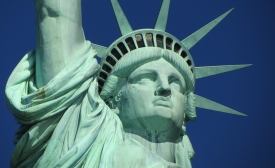Cultural Diplomacy
A North Korean-led taekwondo organization will participate in a world taekwondo championship in South Korea opening Saturday, amid the Moon Jae-in administration seeking “sports diplomacy” to repair its relationship with North Korea.
Yunus Emre Institute, which was established with the aim of promoting Turkish language, culture and art and increasing cultural exchange between Turkey and other countries, has started operating in Washington DC after the first center was opened in Maryland, U.S. last April.

Jay Wang spoke with artists, scholars, and funders in New York about the value of cultural diplomacy.
Children need space to grow and art plays a pivotal role in creating not just any space, but a creative and conducive space. [...] This year, for the first time, the National Gallery of Singapore is making it possible. In its first Gallery Children’s Biennale, Singapore is leading the way in Asia to create space for children through art. The exhibition targets young visitors and it is curated in such a way that aim to captivate the imagination of the young: making art fun, interactive and accessible.

Headlines explore innovative public diplomacy campaigns featuring food, beer and music.
I believe that a final, negotiated FY 2018 budget request for the State Department should include continued funding – if not a gradual increase – of what has been a relatively small amount of money allocated every year to the soft power of “cultural diplomacy.” Roughly defined as the use of an exchange of ideas, traditions, and values to strengthen relations and encourage engagement, cultural diplomacy is perhaps most easily seen in the use of music, arts, and sports to build cross-cultural understanding.

Former U.S. Ambassador Curtis S. Chin on the proposed funding cuts to cross-cultural programs.







